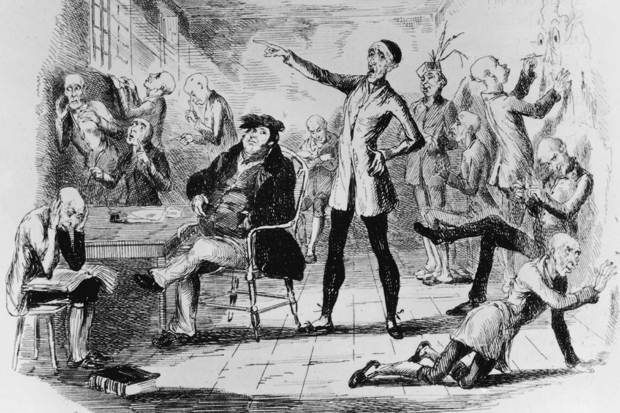Madness is an ancient, evidently inscrutable mystery, often regarded with superstitious fear, yet can provide a refuge from reality. Sometimes, however, the refuge turns out to be a trap. The human brain, beyond even the most rigorous thinker’s continuous control, is equally able to afford exquisite privacy and atrocious chaos.
Andrew Scull, born in Scotland and educated at Oxford and Princeton, a Distinguished Professor of Sociology and Science Studies at the University of California, San Diego, and the author of psychiatric books highly esteemed by medical historians on both sides of the Atlantic, has now written a learned, liberally humanitarian and wryly witty account of how people in civilised societies have tried for more than 2,000 years to limit the amount of harm done by mental abnormality. He writes with such admirable verve and lucidity that it is sad to note that his thesis is gloomy. He comprehensively demonstrates that nobody has ever been able to achieve anything better than keeping madness locked away out of sight or, at best in public view, suppressing its symptoms.
At the outset of this complexly suggestive, profusely illustrated work, Scull promises to consider madness medically and in its social and cultural ramifications. Madness, he observes, remains
a source of recurrent fascination for writers and artists and their audiences. Novels, biographies, autobiographies, plays, films, paintings, sculpture — in all these realms and more, Unreason continues to haunt the imagination and to surface in powerful and unpredictable ways.
The book abounds in references to literature and other arts, none more aptly than Dryden’s couplet, ‘Great wits are sure to madness near allied/And thin partitions do their bounds divide.’
Writers who entertainingly illuminate Scull’s text include Shakespeare, whose Titus Andronicus of all his tragedies is the most pathologically frenzied, Cervantes, whose hero Don Quixote attains sanity only as he is dying, and Henry Mackenzie, an 18th-century novelist whom Scull calls an exploiter of a ‘mawkish but lucrative sector of the literary marketplace’, whose bestseller The Man of Feeling describes a visit to Bedlam. Voyeurs used to pay the keeper of the asylum for the privilege of mocking the inmates, although the sights and sounds of the spectacle, in Mackenzie’s words, ‘the clanking of chains, the wildness of their cries, and the imprecations which some of them uttered formed a scene inexpressibly shocking’. Readers might be reminded of other writers and artists closer to our own times who seem to have been inspired by various psychotic disturbances, such as James Thurber by Mittyesque reveries of relief from his nagging wife, Evelyn Waugh by the paranoiac hallucinations of his alter ego, Gilbert Pinfold, Dalí by distortions of time, and Francis Bacon by alcohol and sexual hysteria. Scull says he ‘seeks to give psychological medicine its due, but no more than its due’, and stresses ‘how far we remain from any adequate understanding of the roots of madness, let alone from effective responses to the miseries it entails’.
There are so many different apparent causes of madness that rival theorists have not agreed whether the prime source is in the body or the mind. Scull surveys the failures to deal effectively with the disease from Ancient Greece to the present. At the time of Hippocrates the Greeks believed physical and mental ailments were caused by imbalances of the four essential bodily humours: blood, choler, melancholy and phlegm — an explanation as convincing as any concocted afterwards. In the era of the Old Testament, theologians said madness was a divine punishment for sin; and ever since then, in varying degrees, afflicted persons have been made to feel guilty and their families ashamed, or at least embarrassed. Scull recounts in gruesome detail how harshly for centuries the mad have been treated in institutions more like penal colonies than hospitals.
Freud’s excavations of regressive complexes in the subconscious offered solace and established psychoanalysis as a thriving industry. Radical therapeutic interventions by electric shock and brain surgery were worse than useless. The overcrowded publicly funded insane asylums were recently disbanded, mainly for financial reasons, and the inmates were ‘returned to the community’, which sometimes meant commitment to lonely suffering in the streets. Now the pharmacologists have taken over. Tranquillising and antidepressant drugs are addictive and expensive, but they help users not to think.
Madness is inseparable from civilisation, Scull concludes. In fact, in every civilised country, the pressures of materialistic ambition in a market-driven economy inexorably increase the incidence of nervous collapse. The ways civilisation is deteriorating, Winston Smith will always love Big Brother, and one day madness will be normal.
Available from the Spectator Bookshop, £23 Tel: 08430 600033






Comments